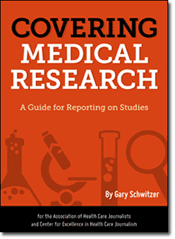Tag
bmj
-
New BMJ resource connects health journalists to established experts
The British Medical Association’s BMJ, one of the oldest and most respected family of medical journals, has launched a tool…

-
Study: Good press releases contribute to good health journalism
Thanks to Gary Schwitzer for drawing attention to a study, published in BMJ, which analyzes the impact medical journal press…

-
•
BMJ analysis reveals widespread publication/selection bias in research
Reporting on a study released by BMJ and characterized as an almost existential threat to the medical research system by…

-
•
Online comments lead to BMJ’s disclosure of ‘competing interests’
In BMJ, Bob Roehr wrote about a report published by German researchers in the Canadian Medical Association Journal describing an…

-
•
BMJ: Wakefield’s vaccine-autism study fraudulent
The Internet and other media are abuzz with the news, published by BMJ yesterday, that the study published in The…

-
•
BMJ wants raw data for all drug trials to be shared
Under the headline “We want raw data, now,” BMJ editor Fiona Godlee recounts the story of how BMJ had to…

-
•
Study: Health journalists face ‘entanglements’
A paper just published in BMJ discusses financial ties between medical journalists and the companies they cover. The authors look…



